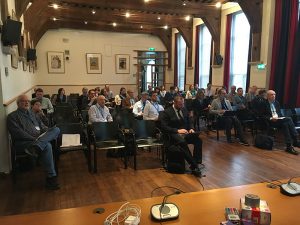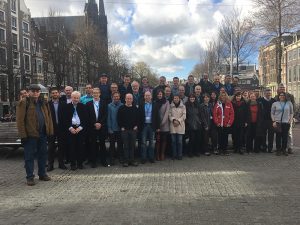Scientific, technical and legal experts from around the world gathered at the 3rd workshop of the EU funded Horizon2020 project GLOBIS-B (“GLOBal Infrastructures for Supporting Biodiversity research”, Amsterdam on 20-22 March 2017).
The 21 invited scientific experts discussed requirements for developing the EBV class ‘Species traits’ which can cover for example phenology, body mass, natal dispersal distance, or migratory behavior. The 11 invited informatics experts from a global group of biodiversity and ecosystems research infrastructures discussed the intricacies of designing and deploying scientific workflows to produce EBVs data products. A team of four invited legal and policy experts worked on defining recommendations on data policies to optimize the use of data in the EBV process.
The Science stream

Scientific experts discussed the current state of collecting, harmonizing and aggregating trait datasets. The following results emerged:
- A revised overview about the societal importance of traits in relation to Sustainable Development Goals (http://www.un.org/sustainabledevelopment/sustainable-development-goals/ ) and Aichi Targets (https://www.cbd.int/sp/targets/ ).
- Suggestions for how to redefine and restructure the EBV class ‘Species traits’, compared to as previously suggested by GEO BON (https://geobon.org/essential-biodiversity-variables/classes/ )
- Recommendations for which international standards should be used for trait data collection and semantic interoperability of trait data
- A summary of the current state of accessibility of trait datasets in regard to human and machine use, licenses and access rights
- Suggestions for endorsing open access trait data when developing EBVs
The results will be summarized in a scientific article. Several experts also indicated their interest to get involved in the future development of the GEO BON working groups (https://geobon.org/working-groups/).
The Informatics stream
Accessibility of data for producing EBV data products requires openness and ‘FAIR’ness (i.e., compliance with the FAIR data principles –https://www.force11.org/group/fairgroup/fairprinciples). Informatics experts concluded that adopting a standard computer-assisted workflow approach to systematic production of EBV data products is essential to ensure robust, reliable and repeatable processes for producing and managing EBV data products. Critical questions include: How to turn a proof-of-principle prototype EBV data product into something that can be properly tested for the first time by real users? Beyond that, how to extend, scale and embed that data product and process more widely after trials are completed? And how to do that systematically for each new EBV data product?

GLOBIS-B advised that GEO BON has an important role to play, communicating information about appropriate technical standards to use in the EBV arena, and working with relevant organizations such as TDWG (the Biodiversity Information Standards group), the Research Data Alliance (RDA), OpenGeospatial Consortium (OGC), and W3C (World Wide Web Consortium) to develop new standards where needed.
The Legal & Policy Stream
Interestingly, this 3rd workshop showed that scientists on species traits, involved in the creation of available datasets were keen, if not almost exclusively oriented, towards working with open data. Most of the trait datasets have established data policies that could be cited as ideal examples of interoperable and open data. Another surprise was that the dialogue between scientists, informatics experts and legal experts did not need prior explanatory exchanges to understand concepts and issues. The CC0 and CCBY licenses and their backgrounds seem to be widely shared.
Nevertheless, there are still common problems. A set of recommendations was discussed to become the final output of the project in 2018. These include:
- Express the ideal requirements for unrestricted data flows leading to valid EBVs calculations;
- Emphasize benefits of the EBVs based on those recommendations compared with the consequences of not achieving them, in terms of cost, technical complexity, or even possibility of building of the said EBV products; and
- Offer alternatives to ideal but not yet achievable recommendations.
The Legal & Policy experts proposed to organize, within the framework of the GLOBIS-B project, an implementation workshop with policy stakeholders to seek endorsement for a number of selected conclusions/recommendations.
